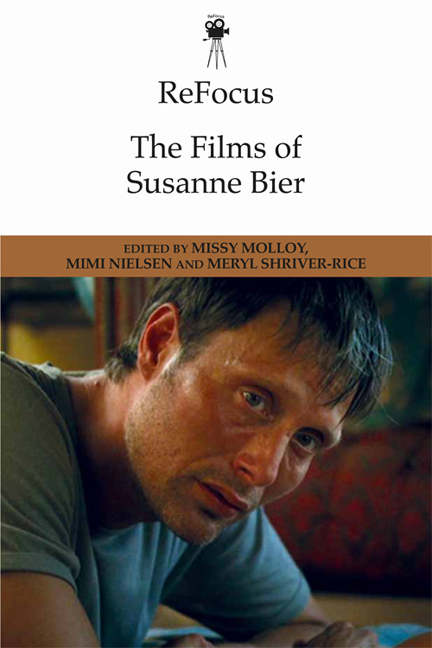Book contents
- Frontmatter
- Contents
- List of Figures
- Notes on Contributors
- Foreword
- Introduction: Susanne Bier's Boundary-Crossing Screen Authorship
- Part 1 Generic and Industrial Fluidity
- Part 2 Negotiating Identity
- Part 3 Authorship and Aesthetics
- Part 4 Transnational Reach
- Postscript: A Conversation with Susanne Bier
- Filmography of Susanne Bier
- Acknowledgments
- Index
8 - Tracing Affect in Susanne Bier's Dramas
Published online by Cambridge University Press: 01 May 2021
- Frontmatter
- Contents
- List of Figures
- Notes on Contributors
- Foreword
- Introduction: Susanne Bier's Boundary-Crossing Screen Authorship
- Part 1 Generic and Industrial Fluidity
- Part 2 Negotiating Identity
- Part 3 Authorship and Aesthetics
- Part 4 Transnational Reach
- Postscript: A Conversation with Susanne Bier
- Filmography of Susanne Bier
- Acknowledgments
- Index
Summary
INTRODUCATION
Susanne Bier has repeatedly disavowed melodrama as the appropriate genre designation for her work. In an interview with Jack Giroux in 2011, she states that the stories contained in her film In a Better World (Hævnen, 2010), “could be very melodramatic, but they’re not.” She adds, “I perceive them as very real … melodrama for me is very much about forcing emotion … about pretending that something is emotional and it isn't really.” In this same interview, Bier notes, “I think authenticity is kind of what I’m after, but also authenticity and intensity.” In a review of After the Wedding (Efter brylluppet, 2006), Kenneth Turan writes that Bier “mainlines emotion,” then adds that, “like all Bier's work, After the Wedding is frankly melodrama … melodrama that point-blank refuses to acknowledge its being melodramatic, conveying its scenarios with enough intensity, psychological acuity to ignore labels and flat-out overpower audiences.” The determination of melodrama, more often than not, implies emotional excess that portends simplistic character development sufficient to undermine both a sense of authenticity and actual affective force (Williams 1998: 58; Doxtater 2012: 10). Yet Turan's phrasing suggests that Bier's insightful character renderings and her work's affective power combine to provide an intensity-laden, evocative experience for audiences that poses a paradox in terms of classification. As such, Turan's statement reflects the longstanding dilemma that the deprecatingly framed feminization of what is simplistically viewed as emotionality poses for genre classification.
In the interview for this anthology, Bier expresses her belief that the assignation of melodrama has much to do with gender and that the criteria applied to her work can be used to classify, for example, Lars von Trier's work as well, but that this is rarely the case. Belinda Smaill similarly claims that Bier's reception has been colored by the historical relationship between gender and genre assignation. She notes that “the terms on which [Bier’s] films are negatively assessed frame the popular dimensions of the work pejoratively as feminine” (Smaill 2014: 15). Smaill's conclusion begs consideration of the challenge inherent in engaging with and applying historically grounded discursive practices, as she states that “historical devaluation of women's production [persists] through a conflation with negatively feminized discourses, including genre and emotion” (Smaill 2014: 15).
- Type
- Chapter
- Information
- ReFocus: The Films of Susanne Bier , pp. 155 - 172Publisher: Edinburgh University PressPrint publication year: 2018



